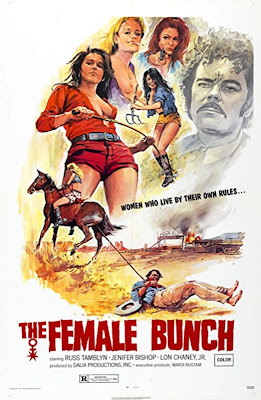The ranch is run by Grace (Jennifer Bishop), a whip-wielding heroin addict. Sure, Grace may be a bitch, but she does take the girls along on drug runs to Mexico, allowing them to fuck the men at the bar while she meets with her connection. One of those men at the bar is Bill (Russ Tamblyn, better known today as Amber’s dad), who makes the mistake of accepting an invitation to visit one of the girls at the ranch, getting branded on his forehead for his trouble. He didn’t even get off first! Bill makes an even bigger mistake when he comes back for revenge. With shit getting real, Sandy reconsiders her membership to this gang of sexy, horseback riding criminals, but escaping might result in her getting buried for good.
The Female Bunch was directed by Al Adamson, so it goes without saying that it’s bad (Al had some help from John Cardos, but Cardos’ involvement doesn’t affect the movie’s quality one way or the other). That said, it’s not one of Adamson’s worst. Sure, the storytelling is sloppy and there’s only a passing concern for continuity and keeping shots in focus, but The Female Bunch manages to scrape by on sheer enthusiasm alone. Few of the females in this bunch can act, but that doesn’t stop them from biting into their bad-girl roles.
One of the females in that bunch who deserves special mention is trans actress Aleshia Brevard (billed as A’lesha Lee), who plays Sadie. Aleshia is generally overlooked by reviewers, most dwelling on how sad it is that this was Chaney’s last film. Hard to believe, given that once you see Brevard it’s pretty hard to forget her. Not only does Aleshia stand a foot taller than her co-stars, gaining extra height from big, flaming red bouffant (only Adamson's wife Regina Carrol’s hair is bigger), her performance is bigger, too. The way she channels her drag queen roots in portraying Sadie had me wishing she’d been made leader of The Female Bunch instead of Bishop. It would certainly be a more interesting movie if she had.
I read Aleshia’s first autobiography when it came out in 2001 (she published a follow-up shortly before her death in 2015) and was excited to finally see her in action. She may not have gotten many good roles (The Love God? and The Man with Bogart’s Face are two of Aleshia’s bigger films), but I’d like to think her work in exploitation films helped pave the way so trans actors like Laverne Cox could get more significant parts today. Though Aleshia is no longer with us, her website is still active and worth a visit for the photos alone.











